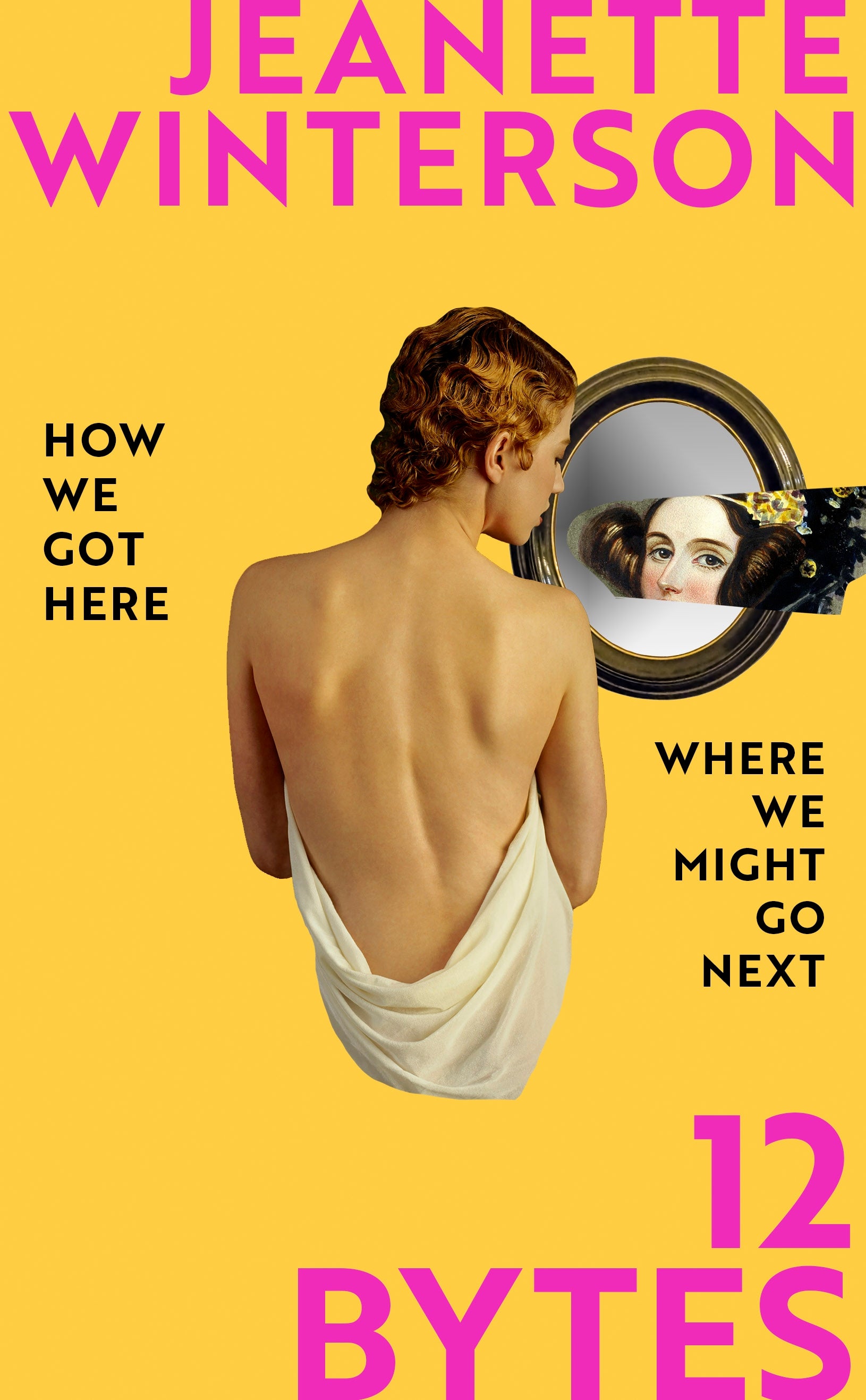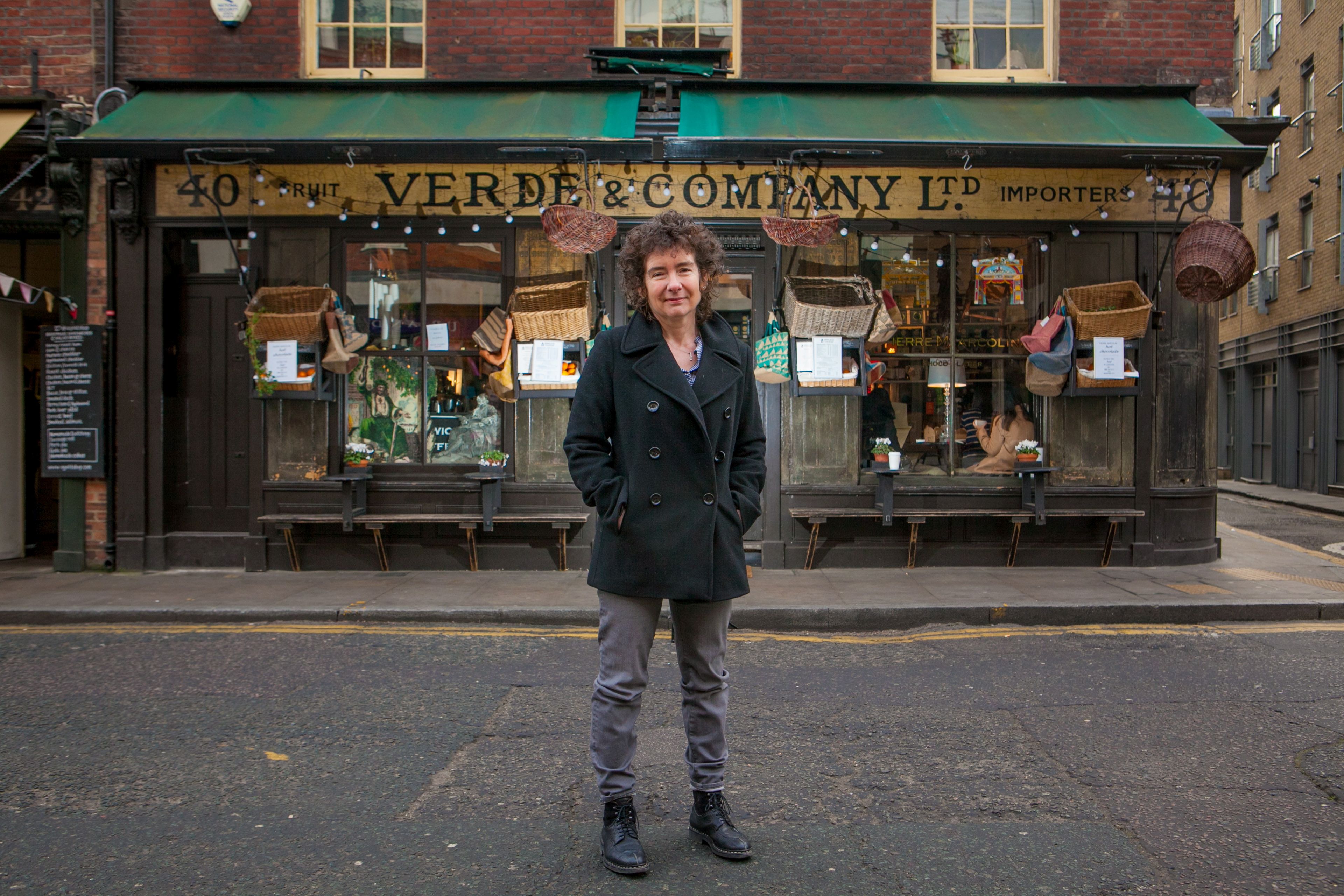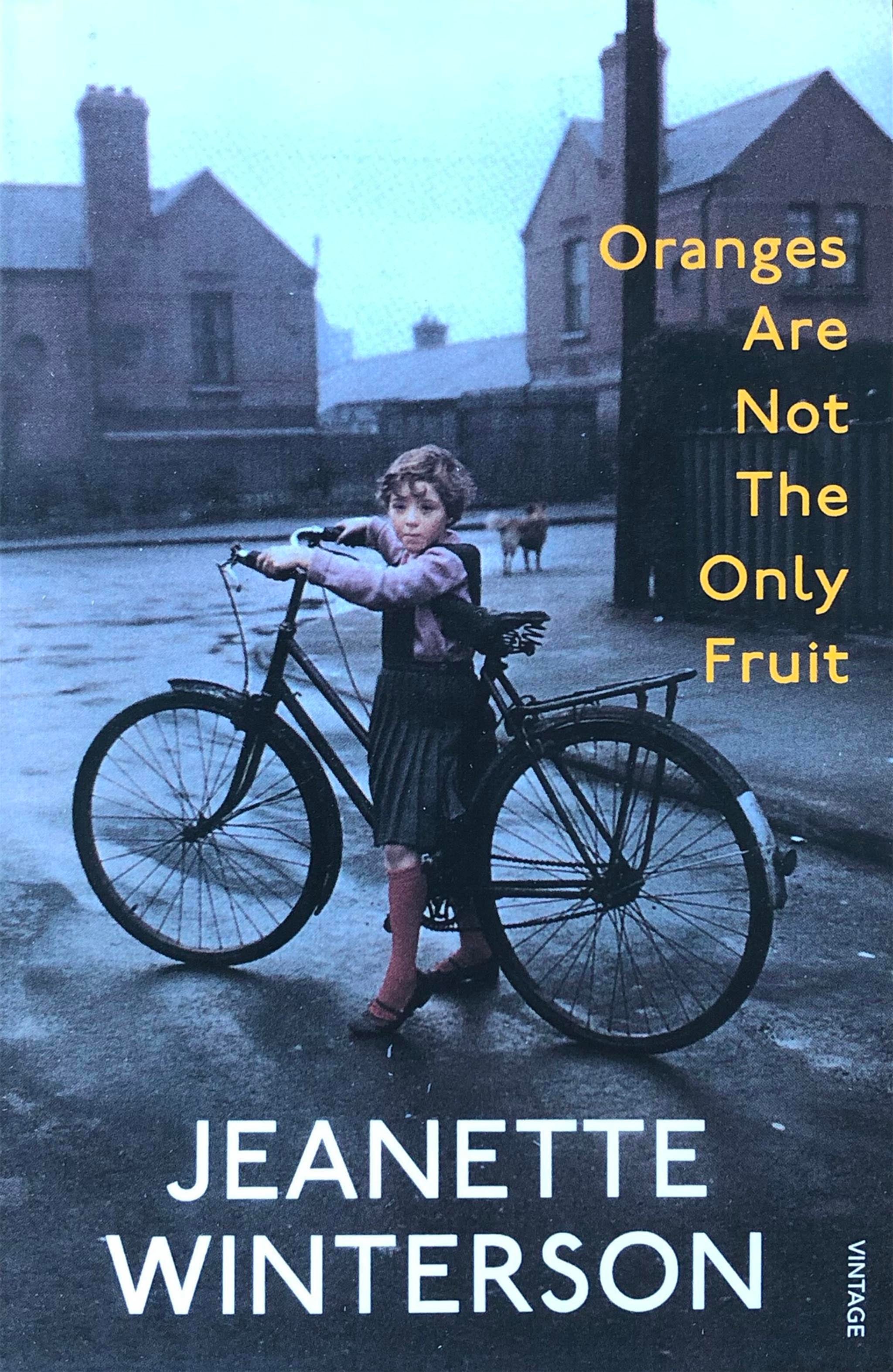
Jeanette Winterson wants to upload her brain to a computer. “If you came along today and said, ‘the technology is in place, we can upload your brain now, you can leave behind this body that’s made of meat… you’ll be able to download yourself into any other form you like, whenever you like,’ I would think that was wonderful,” she tells me. “Totally. I would love that.”
The bestselling author of Oranges Are Not the Only Fruit, her 1985 debut that catapulted her to stardom aged 25, is gung ho about some of the potential advancements in artificial intelligence (AI) – the subject of her new book, 12 Bytes.
It couldn’t be more different from Winterson’s first book – a semi-autobiographical coming-of-age story about a young girl adopted by Pentecostal parents who comes out as lesbian – which won the Whitbread prize for a first novel.
Instead, 12 Bytes takes a feminist look at the AI revolution. In a quick-fire collection of 12 punchy, fact-laden and witty essays, around 5,000 words each, Winterson explores its present and future implications, from transhumanism – the enhancement of the human race beyond its current physical and mental limitations through technology – to the idea that there are only two sexes – male and female – and how our future relationships with non-biological life-forms might turn gender on its head.
Winterson, who is 61 now, with messy, short, curly hair, a relaxed demeanour, and a hint of a Lancashire accent, is talking to me via Zoom from her kitchen in the Cotswolds – a safe 15-mile distance from the “celebrity hotspot” of Chipping Norton, home to the Camerons, Beckhams and others.
She’s a loner, despite being married since 2015 to Susie Orbach, Princess Diana’s former psychotherapist and the author of Fat Is a Feminist Issue. The pair live separately (Orbach in London). It works for them; it is “peace and quiet” and “space” that Winterson craves these days, she says, as she gives me a guided Zoom tour of her garden, with 10 acres of woodland and an outbuilding where she works: she needs an “empty and austere space” in order to write.
Winterson left London in 1994 to live in the Cotswolds, and at the same time bought a derelict Georgian townhouse in Spitalfields, east London, before it became gentrified. She restored it, with its shop front on the ground floor, and turned it into a grocer-cum-deli called Verde & Company; it closed in 2017 after a hike in business rates and is now leased to Montezuma’s, a luxury chocolate brand. She splits her time between the two houses.
It’s a far cry from her poor childhood home in the northern town of Accrington – a place from where she always knew she would escape. Her loveless and emotionally abusive childhood with her adoptive religious evangelist parents Jack and Constance Winterson, who raised her to be a missionary, is a topic she revisited in the hit 2011 memoir Why Be Happy When You Could Be Normal? The book’s title is a question her adoptive mum asked her, when she left home at 16 after taking up with a second girlfriend.
Winterson discovered the transforming power of fiction early on – “You can change the story because you are the story,” she once said. “It was liberating.”
Later books, including The Passion and Sexing the Cherry, were also experimental and boundary-pushing. Her writing engulfs you in lucid, fairytale-like realities that take you on gender-bending and time-warped explorations of religion, love, sex, and sexual identity.
She’s tackled AI before, in 2019’s Frankissstein – a compelling reimagining of Mary Shelley’s classic, longlisted for the Booker Prize – about a transgender doctor and a transhumanist in Brexit-era Britain; in her 2007 sci-fi love story The Stone of Gods, in which her narrator Billie falls in love with a robot; and in The Power Book (2000), which explored the possibilities of the internet.

This time, though, Winterson ponders AI via the essay form, which she says is having a “renaissance”: “People have shorter attention spans,” she insists.
Her aim is to educate the ordinary “non-geeky humans”, as she explains in the book’s introduction, “who imagine they are not much interested in AI, or biotech, or big tech, or data-tech” so that they understand what’s happening as humans advance, “perhaps towards a transhuman – or even post-human future”. It’s an inevitable process, in Winterson’s opinion.
Her projected future, of storing our brains and uploading them to another platform – “initially not made of flesh” – and perhaps living forever, may seem “outlandish”, as is the idea that “AI will not be a tool for long; it will be a life-form” and one that “outsmarts us”.
But as she points out: “So many things that to humans have seemed to be impossibly far-fetched have come true – even the dream of powered flight.”
She also imagines a world that is just around the corner: one where we seamlessly merge with AI with a brain-chip implant. “Within the next decade, neural implants at present being trialled are likely to allow us to access what will be the Internet of Things directly,” she says. “We won’t need a device; we will be the device.”
It’s a world where you won’t have to go to your phone or even shout at Siri to switch something on. “You can just think the thought. The moment that happens, it will feel absolutely like magic,” she says. But “each step is incremental. I think we’ll accept a lot of it along the way. But then we may find that it’s already too late. And we’re in a Big Brother situation.”

While AI-generated novels don’t worry Winterson – “I don’t think it will be very good. But lots of novels aren’t very good anyway. So who cares!” – surveillance does. It’s what she calls “the dark side of AI”. When we are living in our “fully smart houses”, as she describes vividly in her book, with self-locking fridges if we eat too much and AI that anticipates our every need – even keeping tabs on our health – there’s a lot of data collected, analysed, and acted upon. “Everything that you do will actually be known. And that does change all ideas of privacy and the private self.”
But, she says, “we’re already living in a high-surveillance state”.
When I talk to Winterson, the Israeli Pegasus spyware scandal has just broken; the phones of politicians and journalists have been hacked, turning them into a 24-hour surveillance device. “That’s going to be the new normal,” she says.
But Winterson – always the optimist – sees AI as “a very positive tool” that we should work with to save the planet. If it’s not too late. “The biggest threat to us, as we all know, isn’t Brexit or Covid – it’s climate change. Another thing our government’s rubbish on. And I think we need all the help we can get on that.
“I mean, you couldn’t feed these numbers into any system and get any answer except ‘change direction now’,” she says.
I felt as I wouldn’t have felt if I’d been a young man; this great rush to put me in my place and to label me in some way. Because women have to stay in a place and be labelled
Winterson’s book is intriguing, as is her life. She escaped religion, made “a choice” to become lesbian, survived a failed suicide attempt in 2007, and has dated lots of women who “were previously straight”, she tells me. She read English at Oxford University and is a professor of new writing at the University of Manchester. She didn’t take well to sudden literary success. “It was frightening. It made me feel quite ill. I remember I got whooping cough,” she says.
Oranges Are Not the Only Fruit was a word-of-mouth success in independent bookshops until the press picked it up, but it was “pigeonholed, largely by males” as “a small, minor book for a few miserable lesbians”.
“I never wanted it to be that and it wasn’t that,” she says.
It was also put in the cookbook section of bookshops when it first came out. “It was by a woman – so it must be about marmalade and preserves,” she laughs.
“I felt as I wouldn’t have felt if I’d been a young man; this great rush to put me in my place and to label me in some way. Because women have to stay in a place and be labelled. And known. So that was confusing.”

It’s not something she takes personally – at least, not any more. “Gender assumptions are often really unconscious,” she says. “It’s not that somebody is gunning for you.”
It’s timely that Winterson, who has been preoccupied with gender in her novels, is now questioning what will happen to our deep-rooted assumptions about gender in light of the AI revolution. Her 1992 novel Written on the Body played with gender identities that are neither male or female, via a genderless narrator who has an affair with a confused married woman.
What does gender look like in the future? Will we assign gender to our little robots? Give them gender-specific tasks? It’s our choice, she says, but there is “no need to genderise it”. “Really, this is a very good opportunity for us as humans to think, maybe we should be just letting all this gender business go, now,” she says.
“I think probably, you know, all the rows about trans folk at the moment are really going onto a deeper level and saying, ‘Well, what is gender? And why are we so hooked up on it?’”
Winterson feels strangely genderless herself – “I’m not even sure I feel human,” she says. “I wouldn’t be that surprised if somebody turned around and said, ‘Hey, did you know your dad was a Leprechaun?” She starts to laugh hysterically. “It’s that crazy. Anybody who knows me would say, ‘Yeah, and you know what, we wouldn’t be surprised either.’”
This is why the idea of downloading her brain “in more than one shape” appeals to her. “It would be an awfully big adventure.”

Whether Winterson will get to this point in her lifetime is unlikely, but by wading into the AI debate, she’s opening up the conversation away from what she describes as “geeky men”.
“You know, we’re at the cusp of something that could just be really lovely,” she says of a more gender-fluid world – even a genderless one, in which we are the “pure consciousness” of a brain download – and AI can help save our planet.
“But then, there’s the miserable part of me,” she admits, that thinks that “the likes of Donald Trump and [Hungary’s prime minister] Viktor Orbán” – who she sees as representing the counter-movement to sexual and social progress – will “win the day”.
Orbán is certainly topical; he’s just banned any portrayal of LGBT+ people in materials meant for children, and is suspected of using Pegasus spyware to hack the phones of investigative journalists.
“All the progress that we’ve made in our world, which is so valuable and precious. All of that could just go in a heartbeat,” she says. “And it feels like a kind of crazy boys’ videogame, doesn’t it? You just think, who’s going to win? Is it going to be the dark side? You know, or the good side? It’s like, there’s a struggle for the soul of the world.”
‘12 Bytes’ is published on 29 July







